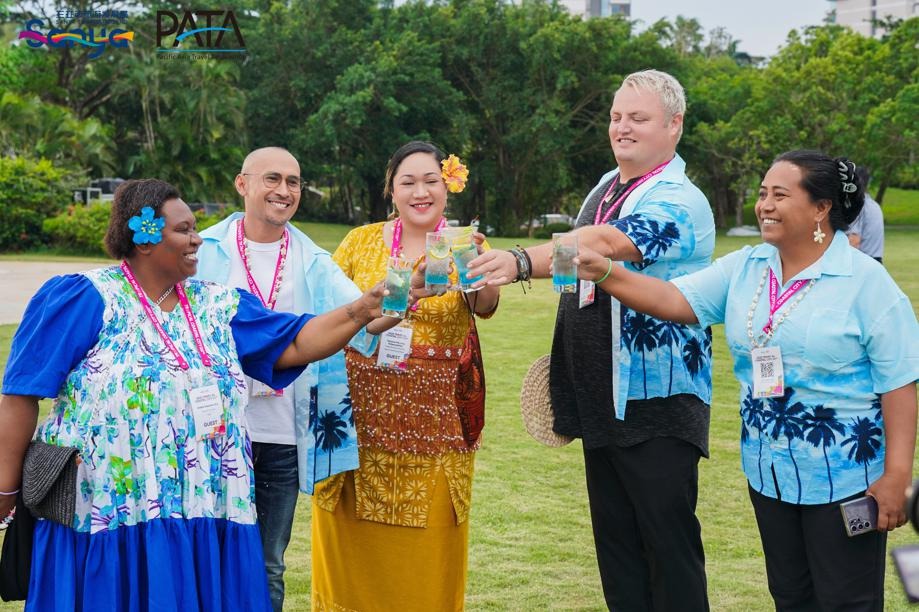Securing a new lease of life

Hong Kong and the Chinese mainland have successfully carried out the first-ever cross-boundary organ-sharing operation, saving the life of an infant. The feat caps the city’s strenuous efforts to create a standing mechanism in organ sharing with the mainland to save more lives. Li Bingcun reports from Hong Kong.

Cleo Lai Tsz-hei, a 4-month-old Hong Kong baby girl, was critically ill with dilated cardiomyopathy — a heart-muscle disease that obstructs the heart’s effort to pump blood to the rest of the body. She was in intensive care in a hospital, surrounded by a web of ventilation machines as tall as an adult to keep her alive. Curves on a mobile screen displayed signs of life in the infant, who was desperately in need of a heart transplant.
Having spent most of her life in a hospital since birth, the view she was most familiar with was the hospital’s ceiling. When awake, Tsz-hei, with big, bright eyes, would often flash a sweet smile during video calls from her mother. Photos of her family were taped to her bedside. During the daily one-hour visiting time, her mother would play videos of Tsz-hei’s brother singing, and her parents telling stories and expressing love for her to lift her spirits.
Tsz-hei was diagnosed with acute heart failure in August when she was just 40 days old — caused by dilated cardiomyopathy that was due to a genetic variation. The little girl had been in and out of Hong Kong Children’s Hospital. She underwent an operation in mid-October, but her condition failed to improve.
Her little heart was too weak and any mishandling could have been fatal. She would often go into a coma after defecating and, on one occasion, suffered a sudden cardiac arrest even with the support of a ventilator and cardiotonics. The girl’s only hope was a heart transplant. Her doctor said a successful operation could increase her survival rate for 10 years to 81 percent.
Tsz-hei’s mother and Hong Kong Children’s Hospital made an urgent public appeal for a donor in late November, but the good news never came. Because she has Type O blood, the girl can receive a heart of any blood type, but the donor must be brain-dead and weigh 4.5 to 13 kilograms, which was the most difficult hurdle to overcome in the bid to save her.
Hong Kong has a low child mortality rate, while the COVID-19 pandemic had caused a setback to organ transplants in the special administrative region. According to figures from Hong Kong’s Hospital Authority, the city conducted eight to 11 heart transplants each year from 2019 to 2022 — down from the peak of 17 in 2018. There were still 73 people on the waiting list for heart donations by November 2022. With time fast running out, Hong Kong Secretary for Health Lo Chung-mau wrote to the national health authorities on Dec 8, seeking a collective effort to save Tsz-hei.

A silver lining
Wang Haibo, who is the founder of the China Organ Transplant Response System (COTRS) — the mainland’s centralized organ allocation computer system — heard the call, and began mobilizing all his resources to give the baby a new lease of life.
His team immediately made a data analysis of Tsz-hei’s case and concluded that the mainland has a much greater possibility of identifying a suitable organ for her, which Wang described as a “decisive” information for the mission.
With the COVID-19 outbreak raging for three years since early 2020, the Chinese mainland recorded 49 cases of children who had been medically declared brain-dead, whose organs matched Tsz-hei’s stringent criteria. However, COTRS didn’t find suitable recipients for the organs. That means there could have been one or two chances a month to save Tsz-hei, according to Wang.
Cross-boundary sharing of organs between Hong Kong and the mainland had never been realized. The SAR had only once donated a cadaveric liver to a patient in Taiwan in 2016 when there was no suitable recipient locally.
Although both Hong Kong and the mainland adhere to international medical standards, they adopt different regulations and allocation systems. For example, the definition of a “relative” who is eligible to donate organs to patients also varies, according to Lo.
A basket of factors needs to be discussed when it comes to cross-boundary organ sharing, especially in seeking the approval of the respective authorities supervising organ donations and transplants, import and export laws and arrangements, and time constraints in transporting organs.
All donated organs have a “golden period” for transplant as they aren’t viable for very long after leaving the human body. The best time frame for transplanting hearts and lungs is four to six hours, while livers can function for up to 12 hours, and kidneys for up to 24 hours.
To achieve the unprecedented mission, more than 20 departments in Hong Kong and on the mainland in charge of administration, as well as medical, legal, and customs affairs, went the extra mile to remove the institutional barriers.
What made it more challenging was that the mainland saw its worst-ever COVID-19 wave of infections after it lifted its anti-pandemic curbs extensively in December. Many of the medical experts and officials who took part in the cross-boundary operation also had to combat infections, although they themselves had come down with the virus.
Throughout the process, the firm belief in life first drove them to address all the difficulties, and the consensus was quite clear to explore every possible means to keep the little baby alive, Wang said.
In another case in April 2016, Ma Cheuk-long — a 20-year-old student of the Chinese University of Hong Kong — also suffered heart failure and urgently needed a heart transplant. The university’s then-president, Sung Jao-yiu, called for help from Hong Kong and the mainland societies in an effort to save Ma, but the attempt failed. Although the student subsequently received a donated heart from a 50-year-old Hong Kong woman in June, he passed away in August that year.

The tough get going
Wang has since seized every opportunity to brief Hong Kong officials and medical experts on the mainland’s progress in organ donations and transplants, and on how both sides can work together to save lives. “We failed to save the student, but we hope to save the next child,” says Wang.
Upon receiving Lo’s request, Wang’s team monitored COTRS day and night for a potential suitable new heart for Tsz-hei. The team eventually identified a heart donor on Dec 15 — a mainland child who had succumbed to severe head injuries and who had resided near Hong Kong.
Following multiple rounds of organ matching with 1,153 mainland patients under the COTRS, no suitable recipient could be identified. COTRS immediately activated the emergency cross-boundary organ-sharing plan.
On the evening of Dec 16, mainland medical workers handed over a small cooler box preserving the donor’s heart to their Hong Kong counterparts at Shenzhen Bay Port. Customs clearance was cut to eight minutes, and the entire delivery process between the mainland and Hong Kong hospitals involved in the operation took only two hours. Tsz-hei’s transplant operation was successfully completed at 1 am the next day. She subsequently left intensive care and has since shown good signs of recovery.
The successful transplant gave Tsz-hei a hard-earned opportunity to conquer her illness and grow up healthy.
Lo said the case has proved that the prospects for cross-boundary organ sharing are promising. Bolstered by the success, he is discussing with the mainland authorities the possibility of setting up a permanent cooperation mechanism to make the best use of donated organs.
Hong Kong has proposed that if COTRS is unable to find suitable organ recipients of donated organs on the mainland, it can share the information with the SAR to try to match the organs with those of patients in the city. In the same vein, if Hong Kong has available organs, it will share them with the mainland.
Lo says such a mechanism can save more Hong Kong lives through heart and lung transplants, and reduce the waiting time for patients needing donated kidneys and livers. Both sides have reached a consensus on the matter, and the SAR government is considering working with nearby mainland cities as a priority. For organs donated from as far away as Beijing or the northeastern mainland, Lo believes they too can also be transported to Hong Kong within the “golden period”, especially kidneys and livers. But apart from civilian aircraft, more-diverse transportation methods, such as the deployment of chartered flights and helicopters, could be used to improve efficiency.
Hong Kong itself has been a pioneer in organ transplants and has contributed to this field being revolutionized on the mainland. COTRS was the product of Wang’s research while he was working at the University of Hong Kong more than a decade ago. Lo hopes Tsz-hei’s case will provide a significant boost in organ sharing between the SAR and the mainland. The Macao SAR began collaborating with the mainland in this field in 2017.
Barriers can be broken down
Despite the latest success, some Hong Kong residents and medical experts still lack adequate understanding of the mainland’s organ-transplant system and have concerns about cross-boundary collaboration. The SAR’s medical authorities say Tsz-hei’s case had been handled legally, fairly and responsibly. Lo hopes it will help Hong Kong people reduce the bias against such procedures and inspire more people to donate organs.
He Xiaoshun, vice-president of the First Affiliated Hospital of Sun Yat-sen University in Guangdong province, says the mainland’s organ-transplant system has been continuously improving, both in techniques and regulations. His team successfully performed the world’s first ischemia-free heart transplant surgery in 2021, and has widely applied the technique to kidney and liver transplants.
The nation’s regulations on human-organ transplants, which were enacted in 2007, have undergone a major revision in recent years, and are aimed at cracking down on violations, protecting the rights of donors and recipients, and strengthening incentives and guidance for organ donations, He said.
As of late 2022, up to 3,000 Hong Kong patients were still on the city’s waiting list for organ transplants, including 2,451 awaiting kidney donations. The waiting period for renal failure patients has reached 4.5 years. To help patients from Hong Kong, Macao and Taiwan, the mainland allows them to register at designated mainland hospitals for organ donations and receive transplants there. About 3,500 Hong Kong residents were on the mainland’s waiting list by 2022.
With the full resumption of normal travel between Hong Kong and the mainland in February this year, Hong Kong patients have resumed going to the mainland in search of suitable donated organs. Martin Chan, who has suffered from renal failure for five years and is receiving hemodialysis twice a week, has registered himself with a Guangzhou hospital, and is on both the Hong Kong and mainland waiting lists.
Chan says he’s heartened by the breakthrough in Tsz-hei’s case as it has brought fresh hopes for patients like him to live a healthy and secure life, and may free them from having to rely on medical support and the fear of a serious deterioration in their conditions.
Like Tsz-hei, Chan could receive a new kidney from a mainland donor as well. He has registered in Hong Kong to donate all his organs after his death, which might also benefit patients on the mainland under the planned organ-sharing mechanism.
Regulations and institutions may have boundaries. But with the goodwill on both sides and the urge to save lives, barriers can be broken down.
- Henan retailer's reparation policy fosters workers' rights
- Shanghai offers blueprint for waterfront renewal
- University licenses smart fish feeding system for 20 million
- Shandong court sentences former insurance chief for bribery
- Culture high on agenda at Sanya tourism summit
- Chinese cities post strong performance in 2025 global innovation index





































